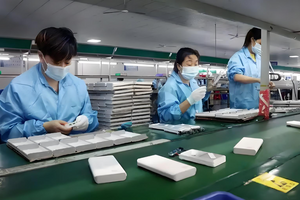
Initial production inspection IPC/IPI
Want to ensure the quality and efficiency of your supply chain? Our Initial Production Control (IPC) service can help you achieve this goal. With our professional and experienced inspection team, you can trust that your products will meet specifications and meet international standards.
What is initial production inspection and why is it important?
Initial Production Inspection is a quality control measure that systematically checks goods and materials at the beginning of the production process. An Initial Production Inspection (IPI) is performed by an impartial third-party inspector to assess the supplier's ability to meet the buyer's quality requirements and identify production risks that may lead to defects or non-compliance.
The IPC process usually includes the following steps:
- Auditing of raw materials and components : ensuring they meet the required standards.
- Inspect production equipment and machinery : verify their operation and maintenance status.
- Evaluate production processes : identify potential problems or areas for improvement.
- Inspect initial product samples : confirm that they meet the agreed quality specifications.
Importance of initial production inspection
Initial production inspection brings many benefits that ultimately translate into higher customer satisfaction and increased profitability. Here are the reasons why initial production inspection is so important :
1. Early detection of quality issues <br>Early production inspection enables companies to identify potential problems early in the production cycle, avoiding the higher cost and time of later detection. This proactive strategy helps companies maintain product consistency and avoid the risk of expensive recalls.
2. Reduce the risk of non-compliance <br>Compliance with industry standards and regulations is critical to your business’s reputation and success. IPI ensures products are manufactured to applicable standards, reducing the potential for non-compliance penalties and legal disputes.
3. Strengthen supplier relationships <br>Initial production inspection helps companies build trust and cooperation with suppliers. Through IPI, companies can make clear quality expectations to suppliers, promote continuous improvement and establish long-term partnerships.
4. Improve operational efficiency
IPI helps companies identify areas for improvement in their production processes, thereby implementing targeted optimization to improve efficiency and productivity. This will save costs and improve profit margins.
5. Customer Satisfaction and Brand Reputation <br>Practicing quality control commitment through IPI can enhance brand reputation, demonstrate the pursuit of high-quality products, thereby enhancing customer loyalty and word-of-mouth communication, and promoting business growth.
Benefits of Early Production Inspection
Initial Production Inspection (IPC) is a key tool that helps companies achieve excellence by gaining a comprehensive understanding of the production process. In addition to the above advantages, IPI has the following significant value in modern business operations:
Data-based decision support
IPI provides decision makers with in-depth insights into production processes, enabling them to make wise choices in resource allocation, process improvement and supplier cooperation. Using IPI data, companies can make strategic decisions to maximize efficiency and productivity, thereby gaining a competitive advantage.
Strengthen production control
IPI enables companies to gain a clearer understanding of production processes and supplier capabilities, thereby strengthening control over production and ensuring that products meet quality standards and expectations. This control can reduce production risks and interruptions.
Reduce costs and increase profitability
IPI can significantly save costs by discovering and solving problems early, avoiding rework and waste. In addition, optimizing processes and improving efficiency can shorten production cycles and further reduce costs.
Detailed explanation of the initial production inspection process: expected steps
Initial Production Inspection (IPI) is a key step to ensure quality control and smooth supply chain. By inspecting products at the early stage of production, problems can be discovered early, saving time and costs while reducing risks. The following are the specific processes and efficient implementation suggestions of IPI:
We play an important role in early production inspection. With our experienced inspection team and deep understanding of industry standards, we follow strict inspection protocols to ensure consistency and accuracy of results.
As an independent third-party inspection company, we remain neutral and provide objective assessments and valuable insights. We will customize the inspection process according to the unique needs of our clients.
Step 1: Sample Selection <br>Randomly select samples from the first production batch to ensure that the inspection is unbiased and truly reflects the overall quality.
Step 2: Comprehensive Assessment <br>The inspector will examine the samples in detail to evaluate material quality, structure, workmanship, function, etc., and review the packaging, labeling and product appearance.
Step 3: Compare with Specifications <br>Compare the inspection results with customer specifications to ensure that the product meets the required standards and design expectations.
Step 4: Identify non-conformities <br>If the product does not meet customer requirements, the inspector will record all non-conformities so that the buyer, importer or brand can negotiate corrective measures with the manufacturer.
Step 5: Report and Recommendations <br>Once the inspection is completed, the customer will receive a detailed report listing the results, potential risks and improvement suggestions.
When to arrange initial production inspection
Initial Production Control (IPC) should be carried out when production is 0-20% complete. This key quality control measure helps buyers, importers and brands identify and resolve problems early, ensuring a smooth production process and maintaining high standards.
Production Cycle <br>Understanding the production cycle is critical to scheduling IPIs. IPIs should be conducted after the production line is ready and small batches are completed so that problems can be corrected before they escalate.
Seasonality and Industry Dynamics <br>Suppliers may face order pressure during peak seasons, leading to quality issues. Scheduling IPI early can help address challenges and maintain quality standards.
Product Complexity <br>Products with complex designs or high technical content require longer inspection time. It is recommended to arrange IPI in the early stages of production to leave room for adjustment.
Supplier History <br>If you are working with a new supplier or a supplier with a history of quality issues, it is recommended to arrange an IPI as early as possible; when working with a trusted long-term supplier, it can be arranged later.
Regulations and Compliance Requirements <br>Industry-related regulations may require inspections at specific stages, which need to be taken into consideration when planning IPI.
Specific inspection contents of initial production inspection
The following concise checklist covers the key inspection items during IPI to help you ensure product quality and safety while optimizing supply chain operations:
Factory Compliance
- Review factory certifications and licenses.
- Evaluate the factory's health, safety and environmental practices.
- Check labor conditions for compliance with local regulations.
Production plan verification
- Confirm production schedule and deadlines.
- Ensure adequate supply of raw materials and components.
- Check the efficiency and safety of mechanical equipment.
Product Specification Review
- Check product design, dimensions and materials.
- Make sure the color, texture and finish are correct.
- Check labeling, packaging and shipping requirements.
Quality Control Process
- Review factory quality control plan.
- Confirm inspection and test methods.
- Evaluate the factory quality management system (QMS).
Prenatal sample inspection
- Check the design and quality of pre-production samples.
- Compare with approved prototype.
- Confirm that products meet standards and specifications.
Raw materials and components inspection
- Check raw material quality and specifications.
- Verify supplier certifications and documentation.
- Check component defects and consistency.
Production process monitoring
- Regularly evaluate production progress.
- Review production reports and records.
- Communicate with plant management to resolve potential issues.
Share this product

Initial production inspection IPC/IPI
Initial Production Inspection is a quality control measure that systematically checks goods and materials at the beginning of the production process. An Initial Production Inspection (IPI) is performed by an impartial third-party inspector to assess the supplier's ability to meet the buyer's quality requirements and identify production risks that may lead to defects or non-compliance.

